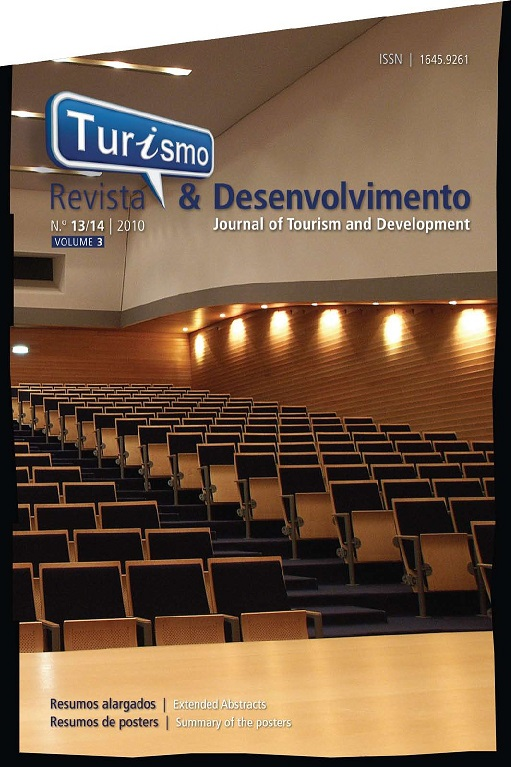Relationships of rural governance and integrated rural tourism: factors determining the support of rural governance policymakers for tourism development
Resumo
Objectives | The principal goal of this thesis is to advance knowledge on the relationships of rural governance and integrated rural tourism (IRT). The main objectives of the research are three-fold: First, to explore the functional and dysfunctional mechanisms of rural governance exerted by the Local Action Groups (LAGs) of the European Union (EU) LEADER Programme, with particular attention on the extent of participation, empowerment and integration of actors. Second, to explore the strategic role and influences of rural governance shaping local tourism development. Third, to identify factors determining local policymakers’ support for tourism development, in particular their perceptions on, and attitudes towards, (i) participation in tourism development, (ii) tourism stakeholder integration, and (iii) the economic, socio-cultural and environmental impacts of tourism.
Methodology | The thesis is a mixed-methods research comprising of a qualitative and a quantitative component, which follows a sequential exploratory design. The qualitative component involves an extensive, exploratory research into the concepts of rural governance under scrutiny (participation, integration and empowerment) and their relations to tourism. 38 in-depth key informant interviews were undertaken with LEADER LAG staff members and leaders, who were selected from the 96 Hungarian LAGs, by a combination of random and snowball sampling. The main aim was to cover all the 7 regions of Hungary and interview around 30 percent of the overall number of LAGs in every region. The interviews were analysed by the ‘Framework’ approach using ATLAS 5.0 qualitative data analysis software. As a result of this phase, a conceptual framework on the dysfunctional mechanisms of rural governance was developed and the patterns of the relationships of rural governance and IRT were mapped. The quantitative component of the thesis draws on both the results of the qualitative phase and the literature review. It aims to bridge four streams of the related literature by developing a model of local policymakers’ support for tourism development. Within this context, the research builds on the various existing models of host community support for tourism development, but switches the target population and focuses exclusively on the perspectives of local policymakers of territorial development policies operating at the local levels. Furthermore, in addition to the tourism impacts, the model includes two new constructs: participation and integration. Considering the role of local policymakers in territorial development as a starting point for model construction, 11 structural relationships were hypothesised between the level of participation, the level of integration and the level of tourism impacts (independent variables) and the support for tourism development (ultimate dependent variable), through the contribution of tourism to overall community development (mediating variable).These latent constructs were operationalised by a field survey employing a self-administered Internet- -based questionnaire. The sampling frame included four national-level networks of local policymakers responsible for territorial development policies in Hungary, comprising 615 local administrative units. Data analysis will be carried out by the two-stage testing process recommended by Sethi&King (1994) andAnderson&Gerbing (1988) through exploratory and confirmatory factor analysis by the LISRAEL procedure and the maximum likelihood method of estimation. The process will as well be in line with Reisinger&Turner’s (1999) application of structural equation modelling in tourism.
Main results and contributions | Both components of the thesis inform theory and practice. In theoretical terms, the qualitative component provides insights into the structural and functional mechanisms of rural governance through empirical manifestations of territorial planning, organisation and decision-making of the LEADER Local Action Groups, whereas the quantitative component tests the validity of social exchange theory in the tourism context from the point of view of rural governance. It contributes to, and enriches the existing literature on, the stream of research investigating the differences in perceptions of tourism between various stakeholder groups. In practical terms, the qualitative component aims to provide pragmatic, action-oriented recommendations on the improvement of the efficiency and effectiveness of rural governance by identifying the dysfunctional mechanisms of the LEADER LAGs. The quantitative component, on the other hand, contributes to strategic planning and management of tourism by predicting tourism preferences of key actors that exert influence on strategic decisions, and participate in setting the future directions of destination development.
Limitations | The results of both components of this thesis are representative only of the population included in the sampling frame, that is, the LEADER Local Action Groups in Hungary (in the case of the qualitative component), and the local policymakers of territorial development policies in Hungary (in the case of the quantitative component). The interviews undertaken with Hungarian LEADER LAGs identify dysfunctional mechanisms of rural governance in a recently joined EU Member State, which might be different from those in old Member States. Further investigation is needed into the comparative properties of functional mechanisms involving those countries with more experiences in participatory rural development.
Conclusions | Considering the highly fragmented supply structure of tourism destinations, integrated tourism development is one of the areas of strategic territorial planning with most potential to stimulate local capacity building and innovation propensity. However, despite recent advances in the academic discourse on community participation in tourism development, surprisingly little attention has been devoted to the strategic role of rural governance. Furthermore, IRT research has explicitly pointed out the dearth of studies mapping the various actors’ potential and social capital to managing relationships and development. This thesis addresses this gap by focusing on the perspectives of local policymakers responsible for various policy areas of territorial development at the micro-regional levels, including tourism. The model of local policymakers’ support for tourism development contributes to the understanding of how stakeholders from various tourism-related policy arenas perceive tourism and participate in shaping the future of destinations.





